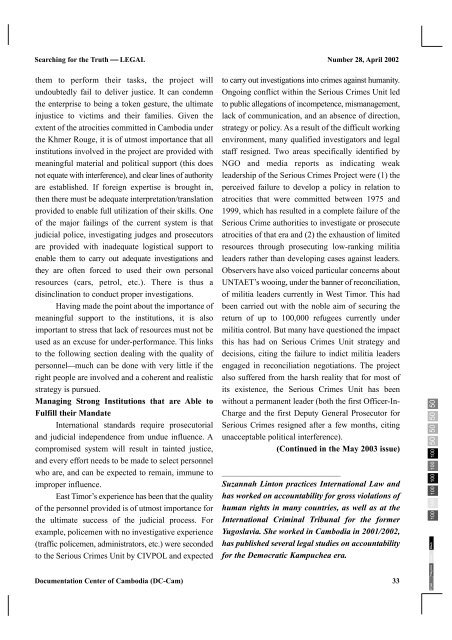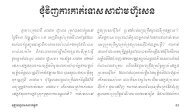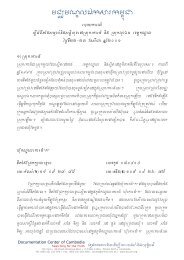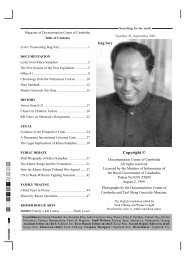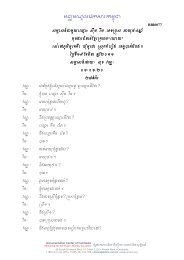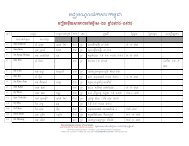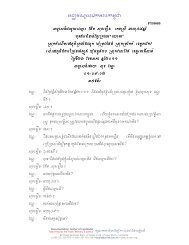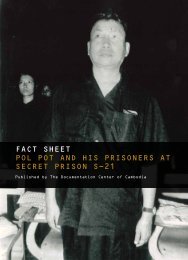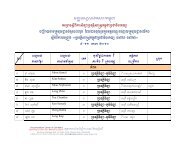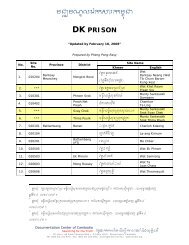Searching for the truth Issues 28 - Documentation Center of Cambodia
Searching for the truth Issues 28 - Documentation Center of Cambodia
Searching for the truth Issues 28 - Documentation Center of Cambodia
Create successful ePaper yourself
Turn your PDF publications into a flip-book with our unique Google optimized e-Paper software.
<strong>Searching</strong> <strong>for</strong> <strong>the</strong> Truth ⎯ LEGAL<br />
<strong>the</strong>m to per<strong>for</strong>m <strong>the</strong>ir tasks, <strong>the</strong> project will<br />
undoubtedly fail to deliver justice. It can condemn<br />
<strong>the</strong> enterprise to being a token gesture, <strong>the</strong> ultimate<br />
injustice to victims and <strong>the</strong>ir families. Given <strong>the</strong><br />
extent <strong>of</strong> <strong>the</strong> atrocities committed in <strong>Cambodia</strong> under<br />
<strong>the</strong> Khmer Rouge, it is <strong>of</strong> utmost importance that all<br />
institutions involved in <strong>the</strong> project are provided with<br />
meaningful material and political support (this does<br />
not equate with interference), and clear lines <strong>of</strong> authority<br />
are established. If <strong>for</strong>eign expertise is brought in,<br />
<strong>the</strong>n <strong>the</strong>re must be adequate interpretation/translation<br />
provided to enable full utilization <strong>of</strong> <strong>the</strong>ir skills. One<br />
<strong>of</strong> <strong>the</strong> major failings <strong>of</strong> <strong>the</strong> current system is that<br />
judicial police, investigating judges and prosecutors<br />
are provided with inadequate logistical support to<br />
enable <strong>the</strong>m to carry out adequate investigations and<br />
<strong>the</strong>y are <strong>of</strong>ten <strong>for</strong>ced to used <strong>the</strong>ir own personal<br />
resources (cars, petrol, etc.). There is thus a<br />
disinclination to conduct proper investigations.<br />
Having made <strong>the</strong> point about <strong>the</strong> importance <strong>of</strong><br />
meaningful support to <strong>the</strong> institutions, it is also<br />
important to stress that lack <strong>of</strong> resources must not be<br />
used as an excuse <strong>for</strong> under-per<strong>for</strong>mance. This links<br />
to <strong>the</strong> following section dealing with <strong>the</strong> quality <strong>of</strong><br />
personnel⎯much can be done with very little if <strong>the</strong><br />
right people are involved and a coherent and realistic<br />
strategy is pursued.<br />
Managing Strong Institutions that are Able to<br />
Fulfill <strong>the</strong>ir Mandate<br />
International standards require prosecutorial<br />
and judicial independence from undue influence. A<br />
compromised system will result in tainted justice,<br />
and every ef<strong>for</strong>t needs to be made to select personnel<br />
who are, and can be expected to remain, immune to<br />
improper influence.<br />
East Timor’s experience has been that <strong>the</strong> quality<br />
<strong>of</strong> <strong>the</strong> personnel provided is <strong>of</strong> utmost importance <strong>for</strong><br />
<strong>the</strong> ultimate success <strong>of</strong> <strong>the</strong> judicial process. For<br />
example, policemen with no investigative experience<br />
(traffic policemen, administrators, etc.) were seconded<br />
to <strong>the</strong> Serious Crimes Unit by CIVPOL and expected<br />
<strong>Documentation</strong> <strong>Center</strong> <strong>of</strong> <strong>Cambodia</strong> (DC-Cam)<br />
Number <strong>28</strong>, April 2002<br />
to carry out investigations into crimes against humanity.<br />
Ongoing conflict within <strong>the</strong> Serious Crimes Unit led<br />
to public allegations <strong>of</strong> incompetence, mismanagement,<br />
lack <strong>of</strong> communication, and an absence <strong>of</strong> direction,<br />
strategy or policy. As a result <strong>of</strong> <strong>the</strong> difficult working<br />
environment, many qualified investigators and legal<br />
staff resigned. Two areas specifically identified by<br />
NGO and media reports as indicating weak<br />
leadership <strong>of</strong> <strong>the</strong> Serious Crimes Project were (1) <strong>the</strong><br />
perceived failure to develop a policy in relation to<br />
atrocities that were committed between 1975 and<br />
1999, which has resulted in a complete failure <strong>of</strong> <strong>the</strong><br />
Serious Crime authorities to investigate or prosecute<br />
atrocities <strong>of</strong> that era and (2) <strong>the</strong> exhaustion <strong>of</strong> limited<br />
resources through prosecuting low-ranking militia<br />
leaders ra<strong>the</strong>r than developing cases against leaders.<br />
Observers have also voiced particular concerns about<br />
UNTAET’s wooing, under <strong>the</strong> banner <strong>of</strong> reconciliation,<br />
<strong>of</strong> militia leaders currently in West Timor. This had<br />
been carried out with <strong>the</strong> noble aim <strong>of</strong> securing <strong>the</strong><br />
return <strong>of</strong> up to 100,000 refugees currently under<br />
militia control. But many have questioned <strong>the</strong> impact<br />
this has had on Serious Crimes Unit strategy and<br />
decisions, citing <strong>the</strong> failure to indict militia leaders<br />
engaged in reconciliation negotiations. The project<br />
also suffered from <strong>the</strong> harsh reality that <strong>for</strong> most <strong>of</strong><br />
its existence, <strong>the</strong> Serious Crimes Unit has been<br />
without a permanent leader (both <strong>the</strong> first Officer-In-<br />
Charge and <strong>the</strong> first Deputy General Prosecutor <strong>for</strong><br />
Serious Crimes resigned after a few months, citing<br />
unacceptable political interference).<br />
(Continued in <strong>the</strong> May 2003 issue)<br />
_______________________________<br />
Suzannah Linton practices International Law and<br />
has worked on accountability <strong>for</strong> gross violations <strong>of</strong><br />
human rights in many countries, as well as at <strong>the</strong><br />
International Criminal Tribunal <strong>for</strong> <strong>the</strong> <strong>for</strong>mer<br />
Yugoslavia. She worked in <strong>Cambodia</strong> in 2001/2002,<br />
has published several legal studies on accountability<br />
<strong>for</strong> <strong>the</strong> Democratic Kampuchea era.<br />
33<br />
100 100 100 100 100 100 50 50 50 50<br />
Black<br />
Yellow<br />
Magenta<br />
Cyan


